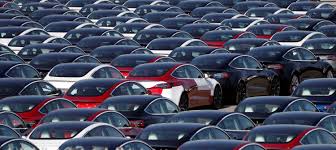
According to an automobile representative group of the United Kingdom, British car sales will be hit throughout this year and into 2023 because of the global semiconductor chip shortage, which had severely impacted auto production and supply to the market in 2021.
Compared to overall new car registrations in 2020 of 1.63 million vehicles, the number last year was 1.65 million units in 2021 – a slight rise, wherein about one in six new cars that were sold in the UK last year was either battery electric vehicles (BEV) or a plug-in hybrid (PHEV), said the Society of Motor Manufacturers and Traders (SMMT).
"Not a great year, coming on the back of an equally poor year," SMMT chief executive Mike Hawes said, talking about the effect of the global shortage of semiconductors on sales which did not make any significant addition to the post-pandemic recovery of the industry.
Modern vehicles make use of semiconductor chips for a range of processes and accessories – from brake sensors to power steering to entertainment systems, and the global shortage of such chips has forced auto companies all across the world to reduce or suspend production. That has resulted in prices of both new and used vehicles being pushed up because of continued strong demand for both genres of vehicles.
Anywhere between 1,500 and 3,000 semiconductor chips are required on the average for vehicles, Hawes said.
"We think demand is still there and demand is still strong," Hawes said.
According to analysts and industry experts, the chip shortage would negatively impact the auto market in the UK throughout the current year and this would "flow through to 2023", he added.
According to a forecast by the SMMT made by the industry body prior to the current wave of the Cpovid-19 pandemic in the country, total car sales for 2022 in the UK were expected to be 1.96 million units which were well below the around 2.3 million units that the country normally witnesses.
In 2021, about 11.6 per cent of the total new cars sold in the country were fully-electric BEVs, the SMMT said, which was higher than the combined sale figures of such vehicles for 2016 to 2020. Almost a quarter of all new car sales in the UK was accounted for BEVs in December.
Last year, 8.9 per cent of the total sale of new vehicles was accounted for by PHEVs, which have both a battery and a combustion engine.
By 2030, the UK government intends to make pure fossil-fuel vehicles illegal. However, according to the SMMT, more has to be done to reduce electric car pricing and enhance charging infrastructure, particularly for on-street charging.
Providing charging access to people who park their automobiles on city streets is a key concern across Europe and America.
Hawes said that car costs and charging concerns are the "biggest barriers to people considering this type of purchase," and added; "we're not where we need to be."
(Source:www.usnews.com)
Compared to overall new car registrations in 2020 of 1.63 million vehicles, the number last year was 1.65 million units in 2021 – a slight rise, wherein about one in six new cars that were sold in the UK last year was either battery electric vehicles (BEV) or a plug-in hybrid (PHEV), said the Society of Motor Manufacturers and Traders (SMMT).
"Not a great year, coming on the back of an equally poor year," SMMT chief executive Mike Hawes said, talking about the effect of the global shortage of semiconductors on sales which did not make any significant addition to the post-pandemic recovery of the industry.
Modern vehicles make use of semiconductor chips for a range of processes and accessories – from brake sensors to power steering to entertainment systems, and the global shortage of such chips has forced auto companies all across the world to reduce or suspend production. That has resulted in prices of both new and used vehicles being pushed up because of continued strong demand for both genres of vehicles.
Anywhere between 1,500 and 3,000 semiconductor chips are required on the average for vehicles, Hawes said.
"We think demand is still there and demand is still strong," Hawes said.
According to analysts and industry experts, the chip shortage would negatively impact the auto market in the UK throughout the current year and this would "flow through to 2023", he added.
According to a forecast by the SMMT made by the industry body prior to the current wave of the Cpovid-19 pandemic in the country, total car sales for 2022 in the UK were expected to be 1.96 million units which were well below the around 2.3 million units that the country normally witnesses.
In 2021, about 11.6 per cent of the total new cars sold in the country were fully-electric BEVs, the SMMT said, which was higher than the combined sale figures of such vehicles for 2016 to 2020. Almost a quarter of all new car sales in the UK was accounted for BEVs in December.
Last year, 8.9 per cent of the total sale of new vehicles was accounted for by PHEVs, which have both a battery and a combustion engine.
By 2030, the UK government intends to make pure fossil-fuel vehicles illegal. However, according to the SMMT, more has to be done to reduce electric car pricing and enhance charging infrastructure, particularly for on-street charging.
Providing charging access to people who park their automobiles on city streets is a key concern across Europe and America.
Hawes said that car costs and charging concerns are the "biggest barriers to people considering this type of purchase," and added; "we're not where we need to be."
(Source:www.usnews.com)














